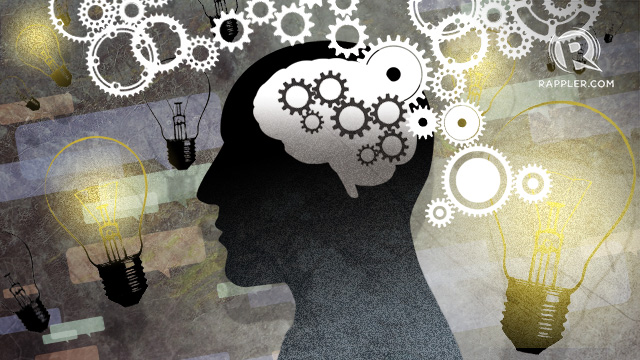
A recent study showed that religious fundamentalists have damaged brains. Apparently, impairments in a part of the prefrontal cortex diminishes one’s capacity to be open minded, leading to the kind of blind devotion that creates monsters like ISIS terrorists. The research builds on previous findings on “cognitive flexibility,” which is the brain’s capacity to consider multiple ideas and possibilities. One’s cognitive flexibility can be impaired because of brain trauma – either through accidents or lifestyle – or one’s genetic profile.
The study discussed religious fundamentalism in particular, but the implications are far-reaching: Some people have a harder time changing their minds. This harrowing biological reality, however, should not prevent us from confronting the need to constantly convince others and to have ourselves convinced. Social media, as is now commonly argued, easily slots us in to self-referential silos, where we simply reinforce what we and our friends already believe and know. This phenomenon is very pronounced in the Philippines, since, as Rappler CEO and Executive Editor Maria Ressa explains, the advocates of authoritarianism have turned the internet into a weapon of deception. At no point in our country’s history have we needed more cognitive flexibility.
It helps to remind ourselves that some remarkable people have made their mark on history by altering strongly held beliefs. Personally, I derive great enjoyment and deep edification from the stories of intellectuals whose search for truth led them to unlikely places. My favorite fictionist is Arthur Koestler, whose psychodrama Darkness at Noon, did more than Orwell’s 1984 (a remarkable novel in itself) to expose the totalitarianism of Bolshevism. What makes Koestler a more fascinating critic Communism than Orwell is the fact that he himself had been a Communist. As a former Party member, Koestler had a profound understanding of the psychology that allows angry people to rid others of their humanity for the sake of a “revolutionary” tomorrow.
In the Philippines, our most piercing critic of domestic Maoism/Stalinism is the former CPP leader and now political scientist Nathan Quimpo. Having seen both bloody barrios and the neutered netherworld of the Netherlands, Quimpo authoritatively tells us what the CPP-NPA would have done had their Philippine revolution succeeded in the 80s: “Thank goodness, we didn’t win in 1986. If we had, the Philippines would have ended up with a regime worse than Marcos’s – a totalitarian dictatorship.” Since ye ole Party suffers from a generalized cognitive inflexibility, what makes anyone think they’d be different if they won today?

Proud of 'hypocrisies'
If I brag about anything, it is about the times I’ve reversed political positions. In college, I was broadly anti-American and thought US presence in Mindanao was imperialist. These days, largely because of the influence of my mentor Patricio Abinales, I think Filipinos have had a deeper history of colonialism in Moro Mindanao than the Yanks, who are now more focused on aid work. During grad school I was part of a Trotskyite socialist party in Australia, which had a romantic attachment to Hugo Chavez. As passionately as I believed in Chavismo then, I can no longer deny that his brand of populism ruined Venezuela (warning, Digong). Most recently, I wrote about my shift from Aquino-basher to “yellowtard.” I am proud of my “hypocrisies.”
Ironically, being comfortable with changing your mind allows you to take more categorical stances. Usually, people are wishy washy because they hedge their bets; they want to look back and be able to claim that they were partially correct. I do not feel the need to be partially correct when I can simply admit that my once categorical stance was categorically wrong. I was wrong when I claimed that my comrade Risa Hontiveros would not win her Senate bid last year, and I was happy to apologize for my strident, incorrect comments. If you’re used to changing your mind, you get used to accepting you’re wrong, and this makes it easier for you to eat crow.
I have relished taking stances, being wrong, revising my positions – rinsing and repeating the process. It’s fun. Yet our society can make it difficult for people to evolve politically and ethically. Perhaps elements of Philippine religiosity have enforced stubbornness, with such shibboleths as: stick to your conscience, keep the faith, and, for those of a different theological orientation, combat revisionism.
We dismiss the periodic mind-changer as a hypocrite or a traitor. And, indeed, some are, like our opportunist politicians who engage in the age-old tradition of turncoatism. But sometimes all it takes is imagination to view political evolution askance: Where some see hypocrisy, see open-mindedness; and where some see integrity, see the arrogance of obduracy.
Fundamentalist zeal is everywhere today. Once upon a time, I thought “die hard supporters” were simply Nora Aunor or Ginebra fans. Nowadays, they are people who endorse the Great Leader regardless of circumstance. And in my lot of “yellowtards” there are a number of self-righteous, sanctimonious blowhards as well.
But the majority of Filipinos do not have brain damage. Some of us might have some cognitive flexibility left, and, as the national drama of Dutertismo unfolds, the field may yet be set for some epic mind changing.– Rappler.com
Lisandro E. Claudio (@leloyclaudio on Twitter) is an Associate Professor at the Department of History, De La Salle University.